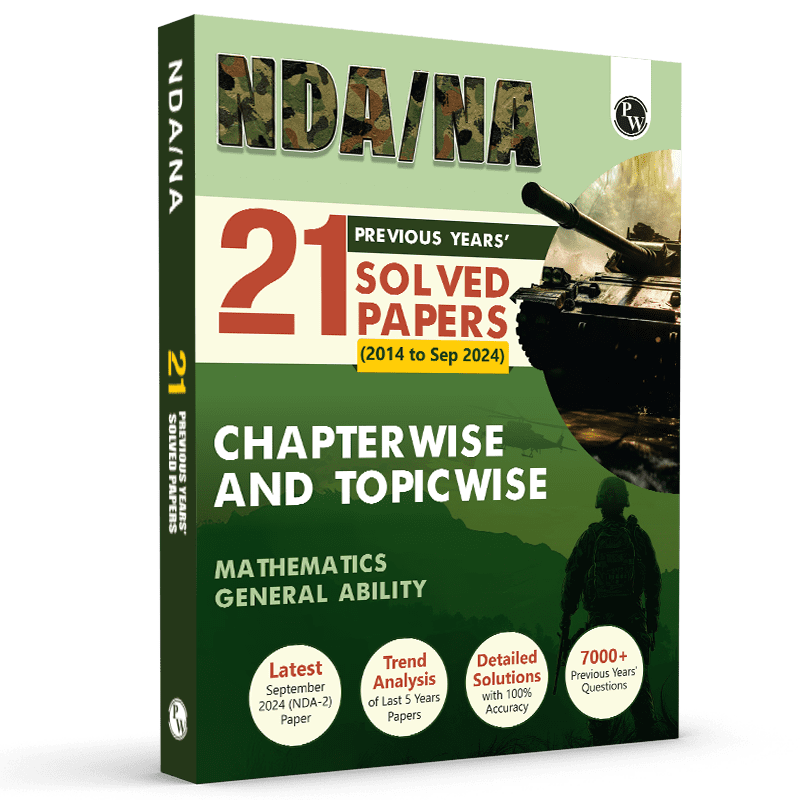NDA Maths Important Chapters and Topics for 2025 Exam

National Defence Academy (NDA) exam is a big step for many young people who want to serve our country. One important part of the exam is the Mathematics paper. This paper has questions from topics learned in Class 9 to 12. It checks how well you know basic math ideas and how you solve problems.
We will explain the main chapters and topics for the NDA Maths exam 2025 clearly and simply. By knowing the NDA maths chapter-wise weightage and NDA maths topic wise weightage, you can see which parts are very important. This helps you plan your study time wisely.
NDA Maths Exam Pattern
Before diving into the syllabus, know the exam structure:
-
Total Questions: 120
-
Maximum Marks: 300
-
Time: 2.5 hours
-
Marking Scheme: +2.5 for correct answers, -0.83 for wrong ones.
-
Sectional Cutoff: 25% (75+ marks out of 300).
Focusing on high-weightage chapters and topics ensures you meet the cutoff and score higher.
NDA Maths Chapter Wise Weightage
Here’s the estimated NDA maths chapter-wise weightage to prioritize your studies:
|
Chapter |
Number of Questions |
Marks |
|
Algebra & Vector Algebra |
40 |
100 |
|
Trigonometry |
20 |
50 |
|
Analytical Geometry |
20 |
50 |
|
Calculus |
20 |
50 |
|
Matrices & Determinants |
10 |
25 |
|
Statistics & Probability |
10 |
25 |
Key Takeaway: Algebra, Trigonometry, and Calculus cover nearly 65% of the paper.
Check Out: NDA Mock Test + PYQs Books
NDA Maths Topic Wise Weightage
Here’s a simplified table summarizing the NDA Maths Syllabus 2025 based on UPSC guidelines:
|
Chapter |
Key Topics |
|
Algebra |
- Sets, Venn Diagrams, De Morgan Laws - Quadratic Equations, Logarithms, Binomial Theorem - Arithmetic & Geometric Progressions - Permutations & Combinations |
|
Calculus |
- Limits, Continuity of Functions - Derivatives (Rules, Applications in Maxima/Minima) - Increasing/Decreasing Functions |
|
Matrices & Determinants |
- Types of Matrices, Matrix Operations - Determinants, Adjoint & Inverse Matrices - Cramer’s Rule & Matrix Method for Solving Equations |
|
Integral Calculus & Differential Equations |
- Integration Methods (Substitution, Parts) - Definite Integrals & Area Calculation - First-Order Differential Equations |
|
Trigonometry |
- Trigonometric Ratios & Identities - Inverse Trigonometry - Applications (Height & Distance) |
|
Vector Algebra |
- Vectors in 2D/3D, Magnitude & Direction - Dot & Cross Products - Applications (Work, Force, Geometry) |
|
Analytical Geometry |
- Lines, Circles, Conic Sections (Parabola, Ellipse, Hyperbola) - 3D Geometry (Distance, Direction Cosines) - Sphere & Plane Equations |
|
Statistics & Probability |
- Mean, Median, Mode, StaNDArd Deviation - Probability Basics, Bayes’ Theorem - Binomial Distribution |
Key Notes:
-
Weightage: Algebra, Calculus, and Trigonometry carry ~60% of marks.
-
Focus Areas: Quadratic Equations, Derivatives, Matrices, Probability, and Coordinate Geometry.
Also Read, NDA Previous Year Question Papers, Download PDF
Recommended Books to Clear Your Dream Job
While Books from NCERT Class 11–12 Maths covers most topics. Despite any confusion you may be experiencing, rest assured that a wealth of books exists that can offer detailed and comprehensive clarification, thereby comprehensively resolving your doubts.
|
Book Name |
Link |
PDFs |
|
Shaurya NDA/NA Mathematics Book |
||
|
Shaurya NDA/NA Combo Set of 4 Books |
- |
|
|
NDA NA 21 Previous Years Solved Papers (From 2014 to Sep 2024) |
||
|
NDA/NA 10 Previous Year Solved Papers 2019-2024 & 10 Mock Tests Book |
Study Tips and Strategies for NDA Maths 2025
Cracking the NDA Maths exam requires a mix of smart planning and consistent effort. Here’s a simple, actionable guide to help you prepare effectively:
1. Create a Realistic Study Schedule
-
Divide Your Time into Phases:
-
Phase 1 (FouNDAtion): Spend 1–2 months mastering basics from NCERT Class 11–12 books.
-
Phase 2 (Practice): Dedicate 2 months to solving problems from previous papers and mock tests.
-
Phase 3 (Revision): Allocate the last month for revising formulas and weak areas.
-
Daily Routine:
-
Study Maths for 2–3 hours daily (e.g., mornings for theory, evenings for practice).
-
Prioritize chapters with NDA maths chapter wise weightage like Algebra, Trigonometry, and Calculus.
-
Weekly Goals:
-
Cover 2–3 topics per week.
-
Take a mock test every SuNDAy to track progress.
2. Read NCERT Books for Clear Concepts
-
Why NCERT?: The NDA syllabus aligns with NCERT Class 11–12 topics. These books explain concepts in simple language.
-
Key Chapters to Focus On:
-
Class 11: Sets, Trigonometry, Coordinate Geometry, Limits.
-
Class 12: Matrices, Integrals, Differential Equations, Probability.
-
How to Use NCERT:
-
Solve all examples and exercises at the end of chapters.
-
Highlight formulas and theorems for quick revision.
3. Practice Problems Daily
-
Focus on High-Weightage Topics:
-
Algebra: Solve 10 quadratic equations daily.
-
Calculus: Practice 5–7 derivative/integration problems.
-
Trigonometry: Work on 5 height-and-distance questions.
-
Previous Year Papers:
-
Solve 5–10 years’ papers to spot repeated questions (e.g., matrix methods, probability).
-
Mock Tests:
-
Take 1–2 mock tests weekly under timed conditions.
-
Analyze mistakes to avoid repeating them.
4. Revise Regularly
-
Weekly Revision:
-
Dedicate SuNDAys to revising formulas (e.g., trigonometric identities, differentiation rules).
-
Monthly Revision:
-
Re-solve tricky problems from earlier chapters like Analytical Geometry or Vector Algebra.
-
Use Flashcards:
-
Write down formulas for quick review (e.g., binomial theorem, circle equations).
5. Manage Time During the Exam
-
Divide the 2.5 Hours Smartly:
-
First 1 Hour: Attempt easy, high-weightage sections (Algebra, Trigonometry).
-
Next 1 Hour: Move to moderate topics (Calculus, Probability).
-
Last 30 Minutes: Tackle tough questions (3D Geometry, Differential Equations) if time permits.
-
Avoid Guesswork:
-
Skip questions you’re unsure about to avoid negative marking.
-
Return to skipped questions in the last 10 minutes.
The NDA Maths exam is designed to test not only your mathematical skills but also your analytical thinking and problem-solving abilities. By focusing on the key chapters and topics, you can build a solid foundation that will serve you well on exam day. Remember to use all available resources, from NCERT textbooks to mock tests and previous year papers, to strengthen your preparation.
Keep in mind that regular practice and revision are essential. As you prepare, always pay attention to the "important topics for NDA maths" that have been highlighted and adjust your study plan accordingly.
Read More: NDA Maths Syllabus
NDA Maths Topics and Chapters FAQs
1. How do I manage time during the NDA Maths exam?
Spend 1 hour on easy sections (Algebra/Trigonometry), 1 hour on moderate topics (Calculus), and 30 minutes on tough questions.
2. What is the difficulty level of NDA Maths?
Questions are moderate (Class 9–12 level). Strong basics and regular practice ensure high scores.
3. Is the Maths paper tougher than the GAT section?
Maths requires conceptual clarity, while GAT tests general knowledge. Both need equal focus to clear the 25% cutoff.
4. What is the NDA Maths syllabus for 2025?
The syllabus includes Algebra, Trigonometry, Calculus, Matrices, Analytical Geometry, and Statistics. Refer to NCERT Class 11–12 books for basics.









